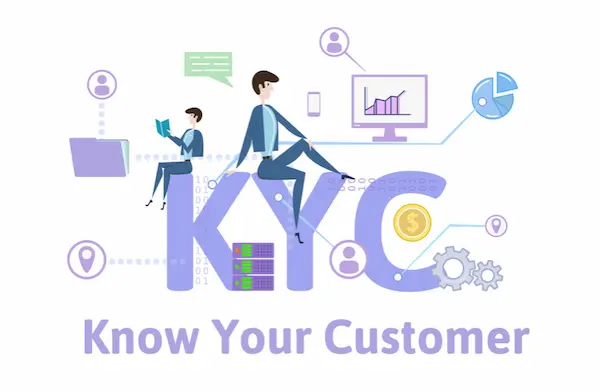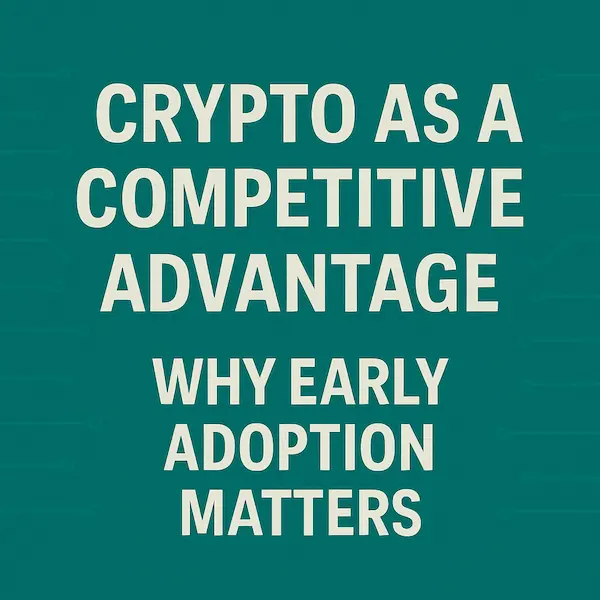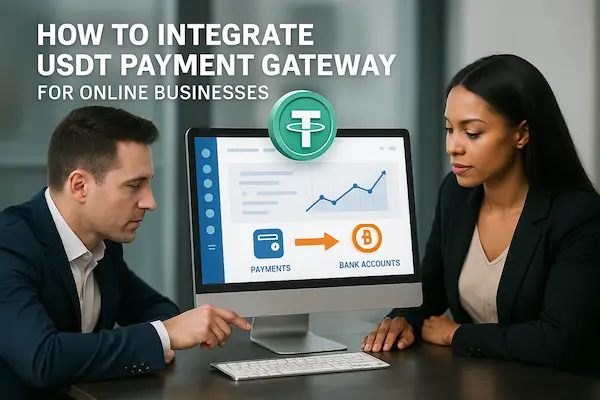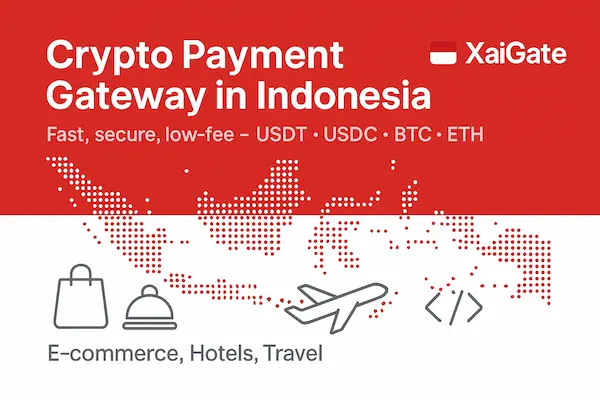Contents
- 1 1. What is KYC and Crypto Payment Gateway without KYC?
- 2 2. Differences between KYC and No-KYC Crypto Payment Gateway
- 3 3. What are the challenges posed by KYC?
- 4 4. Why does KYC seem irrelevant and seemingly unnecessary in the field of cryptocurrencies and cryptocurrency payment gateways?
- 5 5. Why choose a crypto payment gateway without KYC?
- 6 6. How to Select a Reliable No-KYC Crypto Payment Gateway
- 7 7. Why Privacy-Focused Businesses Choose No-KYC Crypto Gateways
- 8 8. Performance Comparison: XAIGATE vs BitPay vs Coinbase Commerce
- 9 9. Why No-KYC Gateways Are Gaining Urgent Attention in 2026
- 10 10. Case Studies on Crypto Payment Gateway Without KYC
- 11 11. Risks and Realities of Operating Without KYC in Today’s Market
- 12 FAQs – Crypto Payment Gateway Without KYC
- 13 Conclusion: Crypto gateway no KYC
1. What is KYC and Crypto Payment Gateway without KYC?
KYC, short for Know Your Customer, is a customer verification process carried out by most banks and financial institutions at the request of the State Bank of each country. This verification is aimed at limiting violations of laws related to money laundering and terrorist financing activities. Each country will have certain requirements and apply a strict verification process to check customer information. For example, personal information such as full name, residential address, ID number, and customer identification photo.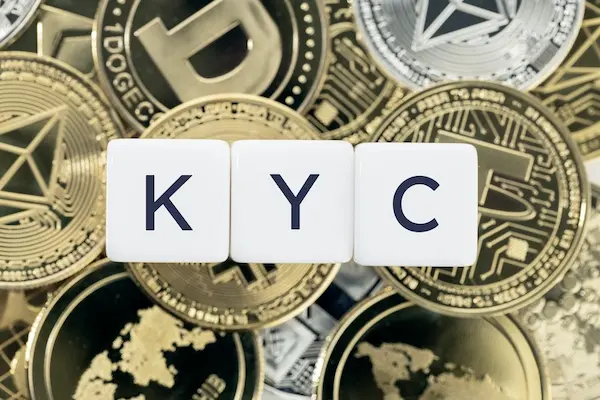
Comparison Table: KYC vs. No-KYC Crypto Payment Gateways
| Feature / Aspect | With KYC Gateway | Without KYC Gateway |
|---|---|---|
| User Verification | Requires government-issued ID, proof of address, and sometimes selfies | No identity verification required |
| Setup Time | 1–7 days depending on verification process | Instant or within minutes |
| Privacy Level | Low – personal data is stored by the provider | High – no personal data collected |
| Regulatory Compliance | Fully aligned with AML/KYC laws in most countries | May operate in gray legal areas depending on jurisdiction |
| Transaction Limits | Higher limits once verified | Often lower limits to mitigate risk |
| Security | High, with compliance-driven protections | Varies; depends on provider’s internal security |
| Ease of Use | Moderate – requires document uploads and approval | Very easy – just connect wallet and start accepting payments |
| Risk of Account Freeze | Possible if flagged for suspicious activity | Lower chance since no identity data is stored, but funds could be held if flagged |
| Anonymity | None | Full or near-full anonymity |
| Best For | Businesses in regulated industries | Freelancers, small merchants, privacy-focused users |
2. Differences between KYC and No-KYC Crypto Payment Gateway
A crypto payment gateway without KYC enables businesses and individuals to conduct cryptocurrency transactions without undergoing identity verification. Unlike traditional payment processors that require users to submit personal information for compliance, these gateways facilitate anonymous, fast, and borderless transactions. There are several differences between KYC and non-KYC crypto payment gateways:| Features | KYC | No-KYC |
| Privacy | Regulatory information sharing | No personal information collection |
| Transaction completion time | Time consuming as the system has to perform the step of verifying the customer’s personal information | Transactions are performed immediately |
| Accessibility | Limited to individuals who have registered personal information on the system | Open to all users and unlimited |
| Compliance burden | Compliance cost for businesses | Minimum compliance requirements |
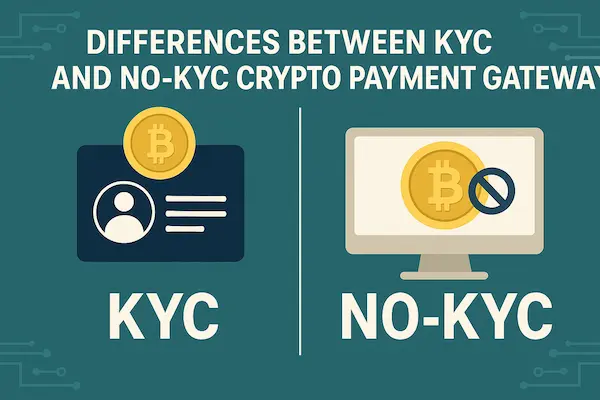
3. What are the challenges posed by KYC?
Today, users are more concerned about whether their personal information is disclosed to any third party. In fact, many users, even large companies, sometimes violate personal data due to the risk of cyber attacks. That is why businesses have spent a lot of money to build a system to manage and secure users’ personal data. The crypto payment gateway without KYC process has also faced many challenges in terms of management and implementation. KYC (Know Your Customer) requirements, while designed to prevent fraud and ensure compliance, can create friction for businesses and users alike. For merchants, KYC often means delayed onboarding, extra paperwork, and the risk of rejection based on jurisdiction or business model. For customers, it introduces privacy concerns, lengthy verification steps, and limited access if identity documents are unavailable. These barriers make KYC-free crypto gateways an attractive solution for businesses that prioritize speed, privacy, and global accessibility.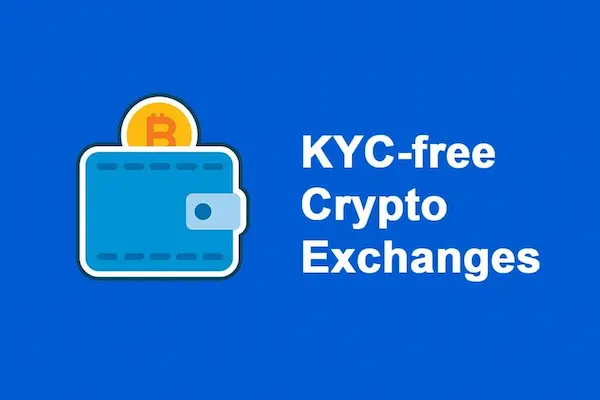
4. Why does KYC seem irrelevant and seemingly unnecessary in the field of cryptocurrencies and cryptocurrency payment gateways?
Bitcoin has been a technological revolution since its inception, a tool to democratize the financial landscape. With truly outstanding features in terms of privacy and security, Bitcoin technology ensures unrestricted access and high transparency, allowing every user to control their transactions. KYC in the current context is ambiguous and seems to contradict the basic features of Bitcoin technology. It is the decentralization and inclusiveness that cryptocurrencies advocate. KYC seems to be only suitable for the identity verification processes of traditional banks, which are difficult to apply in today’s rapidly developing digital age.1. Decentralization vs. Centralized Verification
One of the core values of cryptocurrencies like Bitcoin is decentralization—removing the need for central authorities to control transactions. KYC, on the other hand, is a centralized verification process imposed by third parties. This creates friction because it undermines the trustless nature of blockchain technology, where every user should be able to transact freely without gatekeepers.
2. Privacy and User Autonomy in Blockchain
Blockchain is designed to give users full control over their funds and transactions, ensuring privacy and pseudonymity. KYC requirements force individuals to disclose sensitive personal data, which not only increases security risks (such as data leaks) but also contradicts the principle of self-sovereignty. For many crypto users, the promise of privacy is a primary reason they adopt blockchain payments instead of traditional banking.
3. Global Accessibility and Financial Inclusion
Millions of people worldwide remain unbanked or underbanked due to a lack of traditional documentation required by KYC systems. Cryptocurrency payment gateways without KYC open the door to financial inclusion, allowing anyone with internet access to send and receive payments. This supports the original vision of Bitcoin: to create a borderless, accessible, and censorship-resistant financial ecosystem.
5. Why choose a crypto payment gateway without KYC?
Here are a few reasons that are said to convince most of the users of crypto payment gateway without KYC. Privacy: This is one of the most significant benefits of Bitcoin technology. Users will not be obliged to provide their personal information. Therefore, there will be no privacy breaches Open access: With a decentralized and open platform, any individual can access the crypto ecosystem. No matter where he is, under what circumstances, he can participate in the digital economy without any hindrance. Fast transaction execution time: No third party involved in the transaction. No KYC hurdles. Therefore, the transaction speed will be faster and more cost-effective. High economic efficiency: By bypassing the KYC process and intermediaries, the platform has clearly cut down the transaction costs significantly for both sellers and buyers, or users in general. Optimized user experience: The entire user experience is simplified, friendly and secure.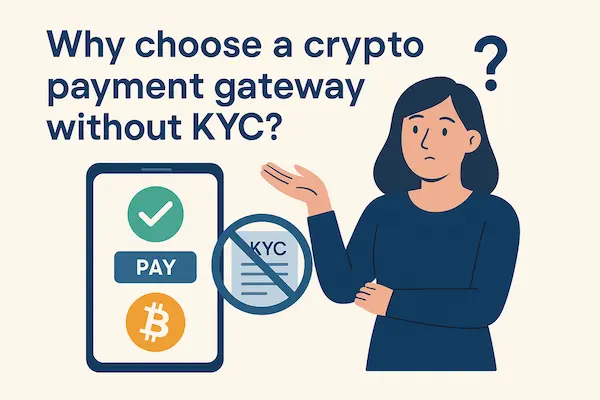
Crypto Payment Gateway Comparison: With KYC vs. XAIGATE (No KYC)
| Feature | Traditional Crypto Gateway (With KYC) | XAIGATE (No KYC) |
|---|---|---|
| KYC Requirement |  Mandatory (ID, documents) Mandatory (ID, documents) |
 Not required Not required |
| Onboarding Time |  2–7 days 2–7 days |
 Instant setup Instant setup |
| Supported Coins | BTC, ETH, USDT (varies) | BTC, ETH, USDT, USDC, BCH, SOL BNB, DOGE, PEPE, etc. |
| Blockchain Network Support | Limited (ETH, BTC mainly) | Multi-chain: Ethereum, BNB Chain, Tron, SOL Polygon |
| Payout Speed | 1–3 business days |  Real-time or same-day payouts Real-time or same-day payouts |
| Merchant Access | Restricted in some regions | Global, borderless access |
| Privacy | Low (KYC data stored) | High (no KYC, no tracking) |
| Ease of Integration | Moderate (some require API keys + KYC) | Simple plugin/API, no KYC delays |
| Fees | 1%–3% + conversion spread | From 0.2%, transparent pricing |
| Ideal For | Large enterprises with compliance needs | Freelancers, small businesses, global shops |
6. How to Select a Reliable No-KYC Crypto Payment Gateway
Choosing the right no-KYC crypto payment gateway is crucial for ensuring smooth transactions and protecting your business. Here are the key factors to consider:-
- Reputation and Reviews – Opt for a gateway with strong user feedback and security measures.
-
- Supported Cryptocurrencies – Ensure the platform supports the digital assets you intend to use.
-
- Security Features – Look for encryption, multi-signature wallets, and fraud prevention systems.
-
- Fee Structure – Compare transaction fees and withdrawal costs before committing.
-
- Payout Methods – Verify if the platform allows direct crypto withdrawals or offers conversion options.
7. Why Privacy-Focused Businesses Choose No-KYC Crypto Gateways
In today’s digital age, privacy is not just a preference—it’s a necessity for many businesses. Industries such as VPN providers, online publishers, digital marketplaces, and even certain freelance platforms increasingly demand payment solutions that minimize data exposure. A crypto payment gateway without KYC provides exactly that: a frictionless, permissionless way to accept global payments without subjecting users to intrusive verification processes. By removing KYC requirements, these gateways reduce user drop-off rates, especially for privacy-conscious customers. According to a 2026 survey by Chainalysis, nearly 41% of users abandon payment flows when forced to complete identity verification, citing time delays and privacy concerns. Businesses that implement no-KYC gateways like XAIGATE not only streamline transactions but also align with a growing shift toward Web3 values—decentralization, anonymity, and user sovereignty. Moreover, crypto gateways without KYC significantly reduce overhead for small businesses. There’s no need to store and secure sensitive customer data, which also lowers the risk of data breaches and regulatory compliance burdens.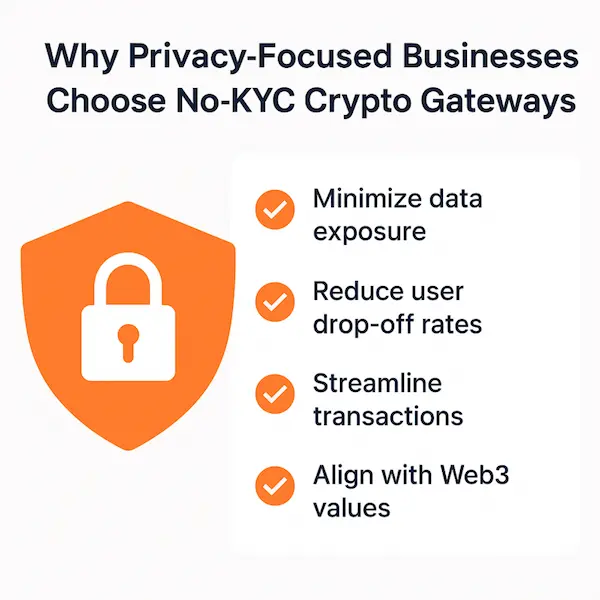
8. Performance Comparison: XAIGATE vs BitPay vs Coinbase Commerce
When it comes to choosing a crypto payment gateway, transaction speed and network fees (gas fees) play a critical role in both user satisfaction and business profitability. Here’s how XAIGATE stacks up against two of the biggest players in the space:| Feature | XaiGate | BitPay | Coinbase Commerce |
|---|---|---|---|
| Blockchain Support | Ethereum, Solana (multi-chain), BSC, TRON | Bitcoin, Bitcoin Cash, Ethereum | Bitcoin, Ethereum, USDC, DAI |
| Transaction Speed |  Solana: ~0.4s Solana: ~0.4s
 ETH: ~15s ETH: ~15s |
 BTC: 10–60 min BTC: 10–60 min
 ETH: ~15s ETH: ~15s |
 BTC: 10–60 min BTC: 10–60 min
 ETH: ~15s ETH: ~15s |
| Gas Fees |  Solana: ~$0.00025
ETH: varies Solana: ~$0.00025
ETH: varies |
 BTC/ETH network fees (high) BTC/ETH network fees (high) |
 BTC/ETH network fees (high) BTC/ETH network fees (high) |
| Confirmation Required | 1 block (Solana) or 3 (Ethereum) | 3–6 blocks (BTC), 1–2 (ETH) | 3–6 blocks (BTC), 1–2 (ETH) |
| KYC Requirement |  No KYC No KYC |
 Mandatory Mandatory |
 Mandatory Mandatory |
| Integration Speed | <15 mins (plug-and-play API) | 1–2 days (manual approval) | 1–2 days (account review) |
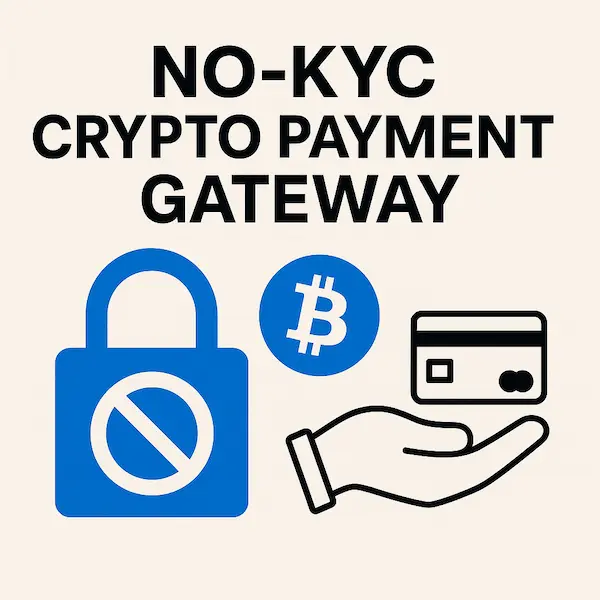
9. Why No-KYC Gateways Are Gaining Urgent Attention in 2026
Over the last 12 months, the cryptocurrency payment landscape has undergone a seismic shift. While KYC-compliant gateways still dominate mainstream commerce, there is a fast-growing niche for payment solutions that bypass identity verification entirely. This isn’t just a quiet trend among privacy enthusiasts — it’s a movement driven by regulatory pressures, economic uncertainty, and the urgent need for faster, frictionless onboarding.
For small businesses, freelancers, and global merchants, the ability to start accepting payments within minutes — without submitting sensitive personal documents — is becoming a lifeline. The urgency is amplified by ongoing changes in financial regulations and the increasing scrutiny over personal data storage.
Regulatory Crackdowns Fueling the Shift
Recent policy changes in the EU’s Markets in Crypto Assets (MiCA) framework and the US Financial Crimes Enforcement Network (FinCEN) have tightened reporting rules. Transactions above certain thresholds are now automatically reported to international financial authorities. For merchants who rely on small, high-frequency payments, this creates additional red tape and delays. As a result, No-KYC gateways are being viewed as a practical workaround to maintain operational speed.
Privacy as a Competitive Advantage
In 2026, consumers are more aware than ever of the dangers of data breaches. Major financial institutions and crypto exchanges have suffered leaks exposing millions of users’ personal details, fueling distrust in traditional onboarding systems. By using a No-KYC gateway, businesses can market themselves as privacy-first — an angle that resonates strongly with audiences concerned about surveillance and identity theft.
Speed Matters in High-Volatility Markets
Crypto prices can rise or fall by double digits within hours. A merchant onboarding delay of even 48 hours can mean missing out on favorable exchange rates or peak transaction demand. No-KYC solutions remove waiting periods entirely, allowing instant integration and payment acceptance, which is especially crucial during sudden bull runs or market dips.
Accessibility for Underserved Markets
In parts of Africa, South America, and Southeast Asia, millions of potential customers and sellers remain unbanked or underbanked. Traditional KYC requirements often exclude them from participating in global e-commerce. No-KYC gateways bridge this gap, enabling participation in the digital economy without traditional identity infrastructure.
10. Case Studies on Crypto Payment Gateway Without KYC
When discussing Crypto Payment Gateway Without KYC, theory alone is not enough. Real-world examples show how businesses, freelancers, and online platforms benefit from faster, borderless, and anonymous transactions. Below are three case studies that highlight practical applications and lessons learned.
1. Small E-Commerce Store Scaling Cross-Border Sales
A small tech accessory shop in Southeast Asia struggled with PayPal and Stripe due to high fees and strict KYC requirements. After integrating a Crypto Payment Gateway Without KYC, the store experienced:
-
Payment settlement time reduced from 3–5 days to just minutes.
-
International revenue increased by 38% within six months.
-
Over 70% of repeat customers cited anonymity and convenience as key reasons for returning.
For small online merchants, adopting a Crypto Payment Gateway Without KYC removes barriers and creates new global opportunities.
2. Freelancers and Digital Nomads Overcoming Banking Restrictions
Freelancers in Latin America often face difficulties receiving payments from U.S. and European clients due to banking limitations and costly SWIFT fees. By using a Crypto Payment Gateway Without KYC, they achieved:
-
Transaction costs lowered from 7–12% to just 1–2%.
-
Instant access to funds instead of waiting 5–7 business days.
-
Elimination of complex identity verification hurdles.
For independent workers, crypto gateways without KYC ensure faster, cheaper, and borderless income streams.
3. iGaming Platform Expanding into Emerging Markets
An iGaming startup wanted to penetrate African and South Asian markets where banking access is limited. By adopting a Crypto Payment Gateway Without KYC, the platform saw:
-
A 52% increase in active users within three months.
-
A 27% rise in average revenue per player.
-
Withdrawal times reduced from several days to under 10 minutes.
In competitive industries like iGaming, a Crypto Payment Gateway Without KYC is more than just a payment solution—it’s a strategic growth driver.
11. Risks and Realities of Operating Without KYC in Today’s Market
While the appeal of anonymity and speed is clear, operating without KYC in 2026 carries significant and evolving risks. Regulatory climates are tightening, blockchain analytics are becoming more sophisticated, and providers face growing pressure from global enforcement agencies. Businesses and individuals must balance the benefits with the potential downsides, especially as legal frameworks shift almost monthly.
1. Jurisdictional Gray Zones
No-KYC operations remain legal in certain jurisdictions, tolerated in others, and outright banned in high-regulation markets such as Japan, Singapore, and parts of the US. The challenge for merchants is that laws can change rapidly — what’s legal today might require full KYC compliance tomorrow. Several providers in Europe had to abruptly suspend services earlier this year following a sudden compliance directive.
2. Increased Scrutiny from Banks and Regulators
Even if your chosen payment gateway doesn’t collect ID, your bank or fiat off-ramp likely will. With advanced blockchain forensics tools like Chainalysis and Elliptic now commonplace, banks can flag accounts tied to No-KYC crypto inflows. This has resulted in frozen accounts and lengthy compliance reviews for some businesses in 2026.
3. Provider Reliability Under Pressure
Several No-KYC providers have gone offline or shifted to partial-KYC models after facing regulatory challenges. In February 2026, a popular European-based gateway abruptly shut down after its payment processor withdrew support, leaving hundreds of merchants scrambling to find alternatives.
4. Balancing Privacy and Compliance
Smart operators are adopting hybrid strategies — using No-KYC gateways for small, low-risk transactions while keeping a KYC-compliant option for larger, high-value transfers. This approach reduces regulatory exposure while still catering to privacy-conscious customers.
Reputation and Customer Trust
In certain markets, operating without KYC can raise concerns among customers unfamiliar with crypto privacy tools. Education is key — merchants must clearly communicate that No-KYC does not mean insecure or illegal, but rather prioritizes user confidentiality while still employing robust transaction security.
FAQs – Crypto Payment Gateway Without KYC
1. What is a no-KYC crypto payment gateway?
A no-KYC crypto payment gateway allows merchants to accept cryptocurrency payments without customer identity verification. It uses non-custodial, wallet-based systems to ensure privacy and fast transactions.
2. Is it legal to use a crypto payment gateway without KYC?
Legality depends on your jurisdiction. In some countries, KYC is required, while in others, non-custodial gateways may not fall under the same rules. Always seek legal advice for compliance.
3. Why do businesses prefer no-KYC gateways?
Businesses choose them for quick setup, global access, lower compliance costs, and privacy benefits. It’s especially useful for startups and merchants serving international customers.
4. Which cryptocurrencies can be accepted without KYC?
Most no-KYC gateways support stablecoins like USDT and USDC, plus major tokens such as BTC, ETH, BNB, and SOL. Multi-chain support ensures flexibility and lower fees.
5. Are no-KYC crypto payment gateways secure?
Yes. Security relies on on-chain settlement, non-custodial design, and blockchain confirmations. Since funds go directly to wallets, there is no custody risk.
6. How do no-KYC gateways prevent fraud?
They integrate smart contracts, address blacklists, and risk-scoring analytics. These tools help block suspicious activity without requiring personal identity checks.
7. What are the legal risks of accepting crypto without KYC?
In crypto-friendly regions, non-custodial models are generally allowed. In stricter markets, businesses must meet AML and CTF standards, so legal consultation is essential.
8. How do no-KYC gateways compare with traditional crypto gateways?
No-KYC gateways are faster, easier to integrate, and more privacy-focused. Traditional gateways often require user verification and higher fees.
9. Can charities accept anonymous crypto donations without KYC?
Yes. Donors can send funds directly to wallet addresses without sharing personal details. This makes it simple for NGOs and projects focused on privacy.
10. Do no-KYC crypto gateways charge extra fees?
No. Most platforms use a transparent, flat-fee model. Transactions are typically low-cost, with no hidden charges or subscription requirements.
Conclusion: Crypto gateway no KYC
KYC-free cryptocurrency payment gateways are changing the way users and businesses manage digital transactions. Among them, XAIGATE stands out for its ability to provide unparalleled privacy, security and accessibility. A platform with friendly users is always the best choice for anyone looking for a reliable payment system. Crypto payment gateways without KYC provide a valuable solution for users seeking privacy, speed, and ease of use. However, they come with regulatory and security challenges that should be carefully assessed. Whether you’re a business owner or an individual looking for a no-KYC payment solution, it’s essential to choose a secure and reputable provider.Quick Summary Table: Crypto Payment Gateway Without KYC
| Criteria | Key Points |
|---|---|
| Definition | A crypto payment gateway without KYC enables fast, anonymous transactions without identity verification. |
| Advantages | Quick processing, enhanced privacy, global accessibility, and easy integration. |
| Disadvantages | Higher regulatory risks, potential misuse for money laundering, limited compliance with financial laws. |
| Common Use Cases | E-commerce, digital services, online gaming, digital content, donations, and charities. |
| Safe Choice Tips | Select reputable gateways with stablecoin support (USDT, USDC, PYUSD…), clear APIs, and transparent customer service. |

